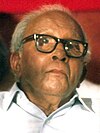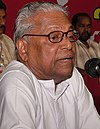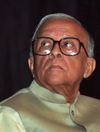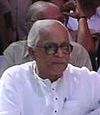List of chief ministers from the Communist Party of India (Marxist)
The Communist Party of India (Marxist) (abbreviated as CPI(M) or CPM) is a communist political party in India that formed as the result of a split in the Communist Party of India (CPI) in 1964.[1] It has the status of a "national party" in India and has headed state governments in three of the states in the country.
A chief minister is the head of government of each of the twenty-eight states and three union territories (Delhi, Jammu and Kashmir and Puducherry). In accordance with the Constitution of India, the governor is a state's de jure head, but de facto executive authority rests with the chief minister. Following elections to the state legislative assembly, the state's governor usually invites the party (or coalition) with a majority of seats to form the government. The governor appoints the chief minister, whose council of ministers are collectively responsible to the assembly. Given the confidence of the assembly, the chief minister's term is for five years and is subject to no term limits.[2]
As of March 2020[update], nine people from the CPI(M) have held the position of a chief minister — four in Kerala, three in Tripura, and two in West Bengal, out of which only one — Pinarayi Vijayan is incumbent.
Kerala
[edit]- * – Incumbent chief minister
| Name | Portrait | Term(s) | Tenure(s)[a] |
|---|---|---|---|
| E. M. S. Namboodiripad | 
|
2[b] | 6 March 1967-1 November 1969 (2 years, 240 days) |
| E. K. Nayanar | 
|
3 | 25 January 1980–20 October 1981 (1 year, 268 days ) 26 March 1987 – 17 June 1991 (4 years, 83 days) 20 May 1996 – 13 May 2001 (4 years, 358 days) |
| V. S. Achuthanandan | 
|
1 | 18 May 2006 – 14 May 2011 (4 years, 361 days) |
| Pinarayi Vijayan* | 
|
2 | 25 May 2016 – Incumbent
(8 years, 182 days) |
Tripura
[edit]| Name | Portrait | Term(s) | Tenure(s) |
|---|---|---|---|
| Nripen Chakraborty | 
|
2 | 5 January 1978 – 5 February 1988 (10 years, 31 days) |
| Dasarath Deb | 
|
1 | 10 April 1993 – 11 March 1998 (4 years, 335 days) |
| Manik Sarkar | 
|
4 | 11 March 1998 – 9 March 2018 (19 years, 363 days) |
West Bengal
[edit]| Name | Portrait | Term(s) | Tenure(s) |
|---|---|---|---|
| Jyoti Basu | 
|
5 | 21 June 1977 – 5 November 2000 (23 years, 137 days) |
| Buddhadeb Bhattacharjee | 
|
3 | 6 November 2000 – 13 May 2011 (10 years, 188 days) |
See also
[edit]- List of current Indian chief ministers
- List of current Indian deputy chief ministers
- List of longest-serving Indian chief ministers
- List of female chief ministers in India
- List of chief ministers from the Bharatiya Janata Party
- List of chief ministers from the Indian National Congress
Notes
[edit]References
[edit]- ^ Daniyal, Shoaib (26 April 2015). "As CPI and CPI-M mull merger, a short history of how they split up in the first place". Scroll.in. Retrieved 3 April 2020.
- ^ Basu, Durga Das (2011) [1st pub. 1960]. Introduction to the Constitution of India (20th ed.). LexisNexis Butterworths Wadhwa Nagpur. pp. 241–245. ISBN 978-81-8038-559-9. Note: although the text talks about Indian state governments in general, it applies for the specific case of Chhattisgarh as well.
- ^ "Chief Ministers". Kerala Legislature. Archived from the original on 8 August 2019. Retrieved 8 August 2019.
- ^ "Premiers and Chief Ministers of West Bengal". West Bengal Legislative Assembly. Archived from the original on 12 March 2016. Retrieved 24 August 2018. Note: The website link may not work as it has few glitches; only the archive link works. Also, the source has few errors regarding the tenure of Ajoy Kumar Mukherjee; the correct dates are provided in the "Origin and Growth" section of the given website.
- ^ "Tripura Legislative Assembly". Legislative Bodies in India. Archived from the original on 27 January 2018. Retrieved 28 January 2018.
- ^ "Biplab Kumar Deb takes oath as Tripura CM". Business Line. 9 March 2018. Archived from the original on 9 August 2019. Retrieved 8 August 2019.
- ^ Krishnakumar, R. (4 April 1998). "Farewell to EMS". Frontline. Thiruvananthapuram. Archived from the original on 6 August 2019. Retrieved 11 August 2019.
